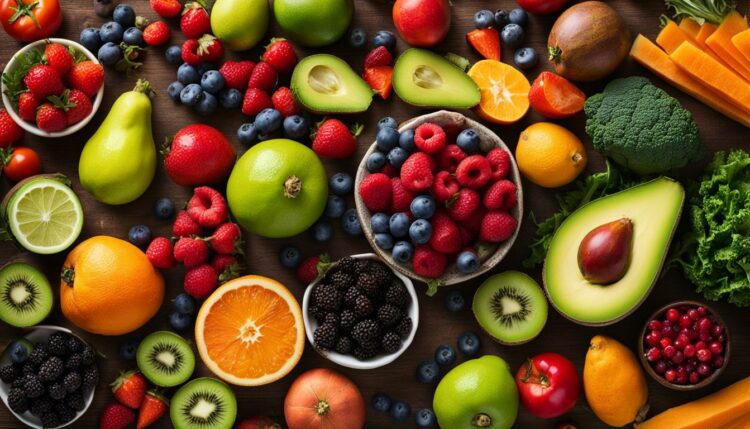Did you know that your skin is the largest organ in your body?
It not only protects you from external factors but also reflects your overall health and well-being. When it comes to achieving healthy skin, skincare products can only take you so far. To truly nourish and care for your skin, a nutritious diet is essential.
By incorporating skin-friendly foods into your meals, you can support your skin’s health, slow down signs of aging, and promote a radiant complexion. So, let’s dive into the world of natural skin care and discover the power of healthy eating for skin health.
Key Takeaways:
- Healthy skin starts from within, and a well-rounded diet is crucial for maintaining skin health.
- Incorporating skin-friendly foods into your meals can protect the skin from damage and enhance its moisture, elasticity, and glow.
- Foods rich in nutrients like vitamins A, C, and E, selenium, zinc, and omega-3 fats are particularly beneficial for your skin.
- By embracing a skin-nourishing diet, you can achieve a natural and radiant complexion.
- Remember, your skin deserves the best care both inside and out!
The Importance of Vitamin C for Skin Health
Vitamin C plays a crucial role in maintaining healthy skin. Not only does it protect skin cells from oxidative damage, but it is also essential for collagen production. Collagen is the main protein in our skin that provides structure and elasticity.
Incorporating foods rich in vitamin C can promote skin health and protect against UV damage. One such food is strawberries, which are an excellent source of vitamin C. In fact, a cup of sliced strawberries provides a whopping 108% of the Daily Value of vitamin C.
By including vitamin C-rich foods like strawberries in your diet, you can support the production of collagen, leading to healthier and more youthful-looking skin. Additionally, the antioxidant properties of vitamin C help protect your skin from oxidative damage caused by environmental factors.
| Benefits of Vitamin C for Skin Health | Sources of Vitamin C |
|---|---|
| Promotes collagen production | Strawberries |
| Protects against oxidative damage | Oranges |
| Supports healthy, youthful-looking skin | Kiwi |
| Helps protect against UV damage | Papaya |
Including vitamin C-rich foods in your diet is a simple yet effective way to enhance your skin health. So, make sure to enjoy strawberries, oranges, kiwi, and papaya to keep your skin radiant and protected.
Gut Health and its Impact on Skin
The health of your gut and skin are closely linked. Imbalances in gut health, known as dysbiosis, can have a direct impact on your skin. Conditions like acne and psoriasis are often associated with an imbalanced gut. To support both gut and skin health, it is crucial to incorporate probiotics and fiber into your diet.
Probiotics are beneficial bacteria that help restore and maintain a healthy gut environment. They can reduce inflammation, support immune function, and improve digestion.
Consuming probiotic-rich foods or taking probiotic supplements can have a positive effect on gut health and subsequently improve skin conditions linked to gut health.
Dietary fiber plays a key role in promoting a healthy gut. It acts as a prebiotic, providing nourishment for beneficial gut bacteria.
Fiber also helps regulate bowel movements, reducing the likelihood of toxins building up in the body and impacting skin health. Including fiber-rich foods like whole grains, fruits, vegetables, and legumes can support gut health and contribute to healthier skin.
Kimchi, a traditional Korean dish made from fermented cabbage and other vegetables, is an excellent addition to a gut-nourishing diet. It is rich in probiotics, aiding in the restoration of healthy gut bacteria. Kimchi is also packed with nutrients like provitamin A and vitamin C, which are beneficial for skin health.
Overall, maintaining a healthy gut through the consumption of probiotics, fiber, and gut-friendly foods like kimchi can have a positive impact on skin health and improve conditions associated with gut imbalances.

Gut Health and Skin Conditions
Gut imbalances, such as dysbiosis, have been linked to skin conditions like acne and psoriasis. By supporting gut health through a balanced diet and incorporating probiotics and fiber, you can improve overall skin health.
The Benefits of Probiotics and Fiber
- Probiotics help restore beneficial gut bacteria, reduce inflammation, boost immune function, and improve digestion.
- Fiber acts as a prebiotic, nourishing healthy gut bacteria, regulating bowel movements, and preventing toxin buildup.
The Power of Kimchi
Kimchi, a fermented dish rich in probiotics, provitamin A, and vitamin C, can contribute to a healthy gut and improve skin conditions associated with gut imbalances.
| Gut Health and Skin | Benefit |
|---|---|
| Probiotics | Restore healthy gut bacteria, reduce inflammation, enhance immune function, improve digestion |
| Fiber | Act as a prebiotic, regulate bowel movements, prevent toxin buildup |
| Kimchi | Rich in probiotics, provitamin A, and vitamin C; supports gut health and improves skin conditions |
Essential Minerals for Skin Health
Sunflower seeds are a powerhouse of essential minerals that promote healthy skin. Packed with protein, vitamin E, selenium, and zinc, sunflower seeds provide a range of nutrients that are vital for maintaining skin health.
Vitamin E, found abundantly in sunflower seeds, acts as a natural sun protectant, shielding your skin from harmful UV rays and reducing the risk of sun damage. It also regulates inflammation, helping to soothe skin irritations and promote a more even complexion.
Selenium, another essential mineral found in sunflower seeds, is known for its potent antioxidant properties. It helps protect skin cells from oxidative stress and damage caused by free radicals. By neutralizing these harmful compounds, selenium helps maintain the integrity of your skin and delays signs of aging.
Zinc, present in significant amounts in sunflower seeds, plays a crucial role in wound healing and the growth of skin cells. It supports collagen synthesis, a process essential for maintaining skin elasticity and firmness.
Additionally, zinc aids in regulating inflammation and sebum production, which can help prevent acne breakouts and promote overall skin health.
To incorporate sunflower seeds into your diet, you can enjoy them as a snack or add them to salads, oatmeal, or smoothies. The crunchy texture and nutty flavor make them a versatile and delicious addition to various dishes.
| Sunflower Seeds: Essential Minerals for Skin Health | |
|---|---|
| Minerals | Benefits for Skin |
| Selenium | Powerful antioxidant properties protect skin cells from damage and delay signs of aging. |
| Zinc | Supports wound healing, collagen synthesis, and regulates inflammation and sebum production. |
| Vitamin E | Acts as a natural sun protectant, shielding skin from UV damage and soothing inflammation. |
In addition to sunflower seeds, bone broth is another excellent source of essential minerals for skin health. Its rich collagen content provides the building blocks for collagen synthesis, promoting skin elasticity and helping to reduce the appearance of fine lines and wrinkles.
By incorporating sunflower seeds and bone broth into your diet, you can nourish your skin from within and support its overall health and radiance.
Organ Meats and their Nutrient Density
When it comes to nourishing your skin from within, organ meats are a powerhouse of essential nutrients. One of the most nutrient-dense protein sources available, beef liver is packed with skin-loving properties.
What sets organ meats apart is their rich content of copper, a crucial mineral for skin health.
Copper acts as a potent antioxidant, protecting the skin against free radicals and oxidative stress that can contribute to premature aging. Additionally, copper plays a vital role in collagen maturation, promoting the elasticity and firmness of the skin.
But that’s not all – organ meats are also abundant in other essential nutrients that support skin health. They are an excellent source of selenium, a mineral known for its antioxidant properties, which helps protect the skin from damage caused by environmental factors.
Vitamin A, found abundantly in organ meats, promotes skin cell renewal and enhances overall skin health. Lastly, the zinc content in organ meats aids in wound healing and supports the growth of healthy skin cells.
By incorporating organ meats like beef liver into your diet, you can enjoy the benefits of these skin-nourishing nutrients. Enhance your skin health and unlock the radiance within with the nutrient density of organ meats.

Benefits of Organ Meats for Skin Health:
- High in copper, a powerful antioxidant that protects the skin against free radicals and promotes collagen maturation
- Rich in selenium, which shields the skin from environmental damage
- Abundant in vitamin A, supporting skin cell renewal and overall skin health
- Contains zinc, crucial for wound healing and healthy skin cell growth
Shellfish: A Skin-Friendly Seafood
When it comes to achieving healthy, glowing skin, shellfish like oysters, clams, and mussels deserve a prominent place on your plate. Not only do they offer exquisite flavors from the sea, but they also provide a variety of nutrients that promote skin health.
One standout nutrient found in shellfish is zinc. Zinc plays a crucial role in regulating inflammation and stimulating wound healing, making it essential for maintaining healthy skin.
Another skin-loving nutrient found in shellfish is selenium. Selenium acts as a powerful antioxidant, protecting the skin against oxidative damage caused by environmental factors and harmful UV rays.
In addition to zinc and selenium, shellfish are also a rich source of omega-3 fats. These healthy fats have anti-inflammatory properties that help reduce skin inflammation and support overall skin function and structure.
Incorporating shellfish into your diet can provide these skin-friendly nutrients, helping you achieve a radiant and youthful complexion.
| Shellfish | Zinc Content (per 100g) | Selenium Content (per 100g) | Omega-3 Fats (per 100g) |
|---|---|---|---|
| Oysters | 78mg | 142.4mcg | 350mg |
| Clams | 8.2mg | 46.0mcg | 170mg |
| Mussels | 2.3mg | 66.0mcg | 0.9g |
Source: USDA National Nutrient Database
Conclusion
Nourishing your skin from within is crucial for achieving a healthy and radiant complexion. While skincare products play a vital role in maintaining skin health, incorporating a well-rounded diet rich in skin-friendly foods is equally important.
By including foods like strawberries, kimchi, sunflower seeds, organ meats, and shellfish in your diet, you can provide your skin with the essential nutrients it needs to thrive.
A skin-nourishing diet can offer a wide range of benefits for your skin. Foods such as strawberries are packed with vitamin C, which protects your skin from oxidative damage and promotes collagen production for youthful-looking skin. Kimchi, a fermented dish, is rich in probiotics and fiber, promoting a healthy gut, which in turn affects your skin’s health.
Don’t forget the importance of minerals like selenium and zinc, found in sunflower seeds, bone broth, and shellfish. These minerals play a crucial role in protecting your skin against damage and supporting collagen synthesis.
Additionally, organ meats offer a nutrient-dense source of copper, selenium, vitamin A, and zinc, all of which contribute to optimal skin health.
By embracing a skin-friendly diet and incorporating these nutritious foods into your regular skincare routine, you can nourish your skin from the inside out. With time, you’ll notice a natural glow and a radiant complexion that reflects the benefits of a wholesome and balanced approach to nutrition for skin health.
FAQ
Are there specific foods that can improve the health of my skin?
Yes, there are certain foods that are known to promote healthier skin. Incorporating skin-friendly foods into your diet can improve the condition and appearance of your skin.
How does vitamin C benefit the skin?
Vitamin C offers numerous benefits for the skin. It protects skin cells from oxidative damage, promotes collagen production, and helps maintain a healthy and youthful appearance.
What role does gut health play in skin conditions?
The health of your gut and skin are closely linked. Imbalances in the gut, known as dysbiosis, can contribute to skin conditions like acne and psoriasis. Probiotics and fiber are essential for supporting gut and skin health.
Which minerals are important for skin health?
Minerals like selenium, zinc, and copper are crucial for maintaining healthy skin. They provide antioxidant properties, regulate inflammation, support collagen synthesis, and facilitate wound healing.
How can organ meats benefit my skin?
Organ meats are nutrient-dense and rich in copper, selenium, vitamin A, and zinc. These nutrients protect the skin against free radicals, promote collagen development, and contribute to overall skin health.
What makes shellfish beneficial for skin health?
Shellfish, such as oysters, clams, and mussels, offer skin-friendly benefits. They are packed with zinc, selenium, and omega-3 fats, which regulate inflammation, protect against damage, and support healthy skin structure.
Do I need to change my skincare routine if I incorporate these skin-friendly foods into my diet?
While skincare products play a role in maintaining healthy skin, incorporating a well-rounded diet rich in skin-friendly foods can enhance the overall health and appearance of your skin. It is a complementary approach to achieving a radiant complexion.




